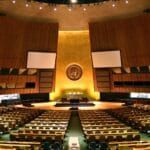Shoddy translation in the Western media is increasing nuclear tensions–again
By Ariane Tabatabai | August 24, 2017
During the Cold War, Soviet leader Nikita Khrushchev made a statement to a group of Western ambassadors that was translated as “We will bury you.” Naturally, what was seen as a rude and bellicose remark by a top Soviet official speaking to foreign diplomats made headlines, and it exacerbated tensions between the rival Eastern and Western blocs. But what Khrushchev actually said was slightly different. Translated more accurately, he said: “Whether you like it or not, history is on our side. We will dig you in,” meaning that Communism would outlast capitalism. Years later, Khrushchev himself finally clarified his statement: “I once said ‘We will bury you,’ and I got into trouble with it. Of course, we will not bury you with a shovel. Your own working class will bury you.” To be sure, the correct statement still wasn’t a model of diplomatic wit and speech-writing, but it was not as threatening as the earlier translation made it out to be.
Though many decades old, this anecdote resonates with observers of United States-Iran relations today. Inaccurate translations, imprecise analyses, and poor reporting have long plagued discussion of Iranian nuclear affairs in Western, English-language media. Now, though, this kind of irresponsibility is particularly alarming, because the nuclear agreement signed in 2015 between Iran and six world powers is in a fragile state. The agreement, known as the Joint Comprehensive Plan of Action, or JCPOA, curbs Iranian nuclear activities in exchange for sanctions relief, and is critical to advancing the US objective of keeping Tehran away from the Bomb without resorting to military force. US President Donald Trump has gone from pledging to dismantle the deal to trying to kill it by a thousand cuts. Meanwhile, various American interest groups are jumping in to advocate for their own preferred Iran policy options, including leaving the JCPOA and pursuing regime change. All this makes it even more critical than before for journalists and experts to get the facts right.
In foreign policy reporting, especially during periods of heightened tension and escalation, translations are a particularly challenging part of the journalist’s job. Mistranslations and inaccurate reporting can be consequential, as even the slightest mistakes can change meaning and generate crises.
During his tenure as Iranian president, hardliner Mahmoud Ahmadinejad often made headlines in the West for his combative statements, which led to debates about accurate translations. During his first few months in office in 2005, for example, he started a controversy that has outlasted his presidency when he quoted the Islamic Republic’s founder, Ayatollah Ruhollah Khomeini, saying that Israel would be “wiped off the map.” The statement became the topic of much discussion in US foreign policy circles and continues to be brought up periodically. At the time of the statement, some argued that it captured the Iranian regime’s despicable stance toward Israel and demonstrated just how immediate the threat truly was. Others said the statement had been mistranslated by Western media. In fact, they argued, Ahmadinejad hadn’t threatened to wipe Israel off the map. Rather, in a vein similar to the Khrushchev comment, he had said Israel would eventually be wiped off the map. It’s the difference between threatening to kill someone and forecasting their death. But given that Ahmadinejad also questioned and denied the Holocaust, his Israel remark came to define his presidency.
The moderate President Hassan Rouhani and his team made a point of speaking to US and Western media upon his inauguration in 2013 to undo damage from the rhetoric of the Ahmadinejad years. The issue of Israel and the Holocaust often came up. Rouhani tried to distance himself from Ahmadinejad’s comments, and called the Holocaust “reprehensible and condemnable.” But since his second inauguration this month, Rouhani and his team’s statements have become a new source of controversy and mistranslation. Poor reporting contributes to this new episode.
Certainly, the Trump administration’s harsh words towards Tehran and refusal to clearly state its commitment to the nuclear deal have put Rouhani in a rhetorical pickle. At home, he often finds himself having to defend his decision to negotiate with America and his continued commitment to a foreign policy of “constructive engagement.” And as the nuclear agreement—the chief foreign policy legacy of his first term—loses the domestic support it once enjoyed, he has faced more pressure to defend it, and to try to deter America from ripping it apart. As a result, Rouhani has had to show more force when talking about Washington and the future of the deal. His team has followed suit.
Nevertheless, the bottom line of all statements coming out of Tehran about the nuclear deal is that the country is committed to preserving it. This is currently the consensus within the regime; whether everyone likes it or not, the JCPOA is the law of the land. Yet given US threats to renege on the deal, Rouhani also has to hedge. So he is laying out his country’s options and the possible outcomes should America withdraw from the process. It is in this area that many reporters have translated his statements inaccurately.
For example, on August 15, Reuters inaccurately reported that Rouhani said his country “could abandon its nuclear agreement with world powers ‘within hours’ if the United States imposes any more sanctions.” The article went on to misquote Rouhani as saying: “If America wants to go back to the experience (of imposing sanctions), Iran would certainly return in a short time—not a week or a month but within hours—to conditions more advanced than before the start of negotiations.” In fact, what Rouhani said was: “New US officials should know that the failed experience of sanctions and coercion brought their previous governments to the negotiating table. And if they want to return to that experience, surely, in a short amount of time, not in a period of weeks and months, but hours and days, we will return to a much more advanced situation than that of the beginning of the talks.” In other words, Rouhani wasn’t threatening to leave the JCPOA if the United States imposed more sanctions on it—as the article’s title suggested and its content indicated—but to resume elements of its program if Washington decided to leave the JCPOA. At the same time, Rouhani reiterated that his country’s preferred course of action was to preserve the deal—but he wanted the United States to know that Iran, too, had options.
More recently, Ali Akbar Salehi, the head of the Atomic Energy Organization of Iran and a former nuclear negotiator, gave an interview to Iranian state television in which he reiterated Iran’s commitment to upholding the deal. But he also issued a warning that should America abandon the deal, Iran would have options: “If we decide, we can start 20 percent enrichment in Fordow in under five days. And this means a lot. From a technical perspective, it would send a signal, and the adversary would understand that.” Salehi went on to note that if the United States withdraws from the nuclear agreement with Iran, the United States would lose its credibility and wouldn’t be able to convince the North Koreans to enter a nuclear agreement with it, should Washington choose to pursue that political and diplomatic path. But the British newspaper The Independent initially reported that Iran could have nuclear weapons within five days of the United States withdrawing from the deal. In addition to the poor translation and sensational reporting in their original story, this is factually incorrect because Iran doesn’t have the capability to produce nuclear weapons in such a short amount of time. The Independent later corrected the mistake after a number of people pointed it out on social media.
These inaccuracies would be problematic under normal circumstances, but they are particularly irresponsible at a time of heightened tensions, during which misperceptions could quickly torpedo the nuclear deal and put the United States and Iran on a collision course. Right now, the Trump administration is reviewing its policy on the JCPOA, Iranian support for the deal is diminishing, and hawks on both sides see this fragile state of affairs as an opportune moment to kill it off completely. If journalists are to hold those in power accountable, they must be held accountable themselves.
Together, we make the world safer.
The Bulletin elevates expert voices above the noise. But as an independent nonprofit organization, our operations depend on the support of readers like you. Help us continue to deliver quality journalism that holds leaders accountable. Your support of our work at any level is important. In return, we promise our coverage will be understandable, influential, vigilant, solution-oriented, and fair-minded. Together we can make a difference.
Topics: Columnists, Nuclear Weapons















